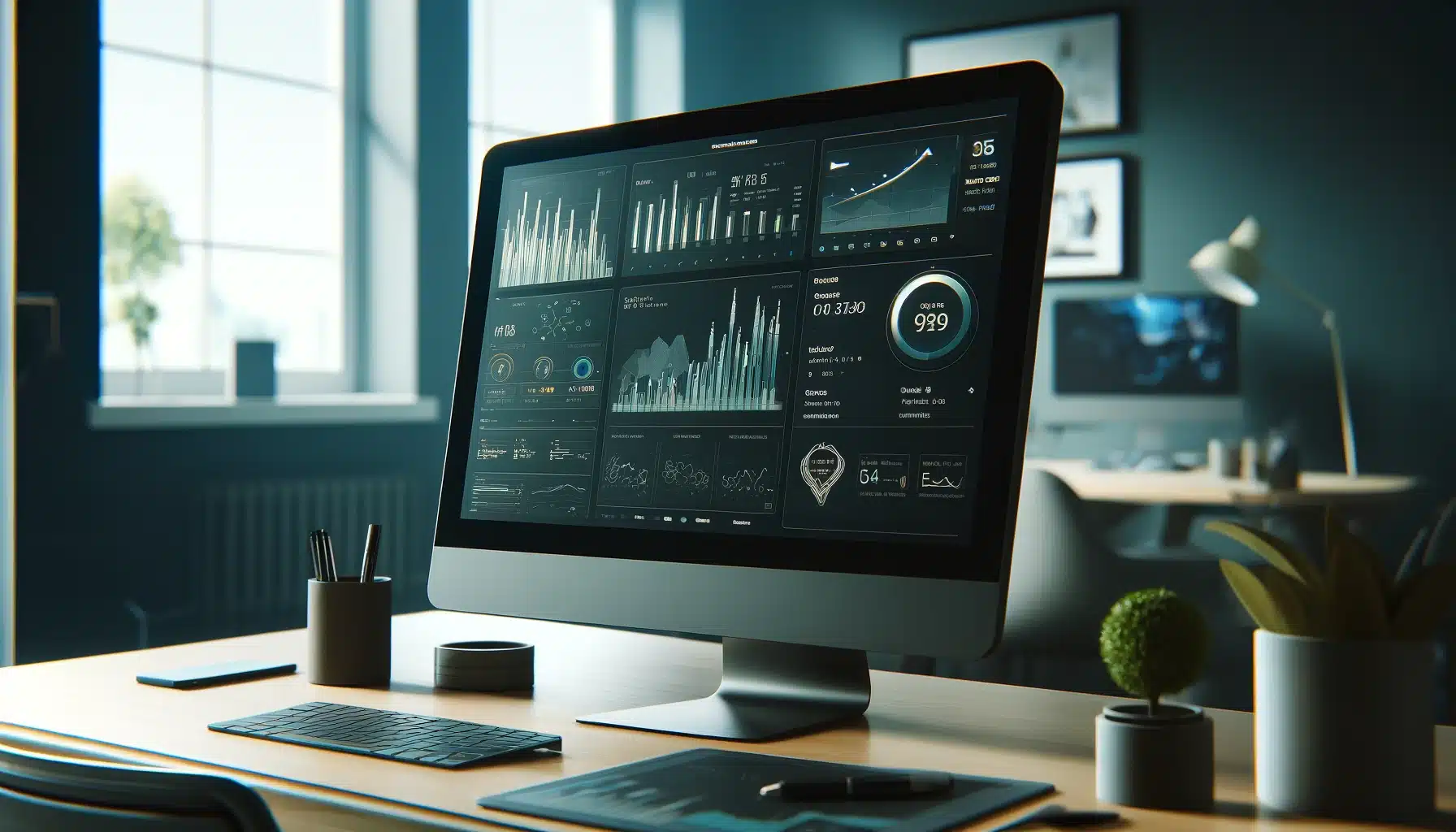In the world of SEO and content marketing, there are several big players when it comes to factors which influence Google’s rankings. The quality of your content matters, sure, as does the technical aspects of your content. But there’s one particularly notable element, which can really sway the ranking tides: your backlinks.
These are links from other websites which point to your site, and this ranking factor has long been lore for its importance. But how exactly do backlinks play into rankings, and how do we measure the “strength” of your website in this area?
For that, we turn to a metric called domain rating.
Domain rating, or DR for short, is a metric used to estimate how likely your website is to rank well in search results, based on your website’s backlink profile. The logic is that the more high-quality backlinks you have, the stronger your backlink profile is, and the higher your domain authority is likely to be.
DR matters because backlinks are thought to work as recommendations, or signs that your website is a trusted, valuable authority on a subject. They’re indicators that your site has topical authority, or that it’s authoritative on your particular subject. Because of this, the more high-quality backlinks your site has from other relevant sites, the more weight it carries in the eyes of search engines.
With that in mind, here’s everything you need to know about domain rating, including how to build it, to eventually help your content rank better.
SEO Ranking Factors: What We Do (and Don’t) Know
Let’s rewind a bit, and touch on how exactly content ranks on Google. Gone are the early days when you could simply publish a piece of content, rich with a few instances of a relevant keyword, and get it to rank on Page One. Oh, 2009, what a time.
Today, there are believed to be hundreds of factors which influence how content ranks. Many factors have been confirmed by the search engines at one point or another, while others are known based on circumstantial evidence.
For example, Google has published its E-E-A-T guidelines, which describe how content is ranked based on expertise, experience, authoritativeness, and trustworthiness. But other than that, there’s not really a published official “list” which details all of the factors used to determine ranking. In some cases, ranking factors have been confirmed in passing comments: for example, back in 2016, a Google exec confirmed that backlinks are one of the search engine’s strongest ranking factors.
Other ranking factors are known by marketers who have worked in this space since the beginning, and who have collected data and monitored results. These include technical SEO practices, length of content, page optimization, and mobile-friendliness, for example.
But circling back to links: backlinks are a known frontrunner factor when it comes to rankability. And the strength of your website’s backlinks is measured with domain rating.
Breaking Down Domain Rating
Domain rating is a score, originally developed by the SEO toolset Ahrefs, which estimates the strength of your website’s backlink profile on a scale of 0 to 100. The more high-quality backlinks your site has, the stronger your backlink profile is, and the higher your DR will be.
A few factors to keep in mind when it comes to DR:
- It considers the quantity of unique websites linking to your site.
- It also weighs the authority of those linking websites. It’s the same as if you spoke to a renowned expert on a topic versus someone unknown. Who would you trust more?
- Link juice is also a factor, which is the SEO-coined term referring to when a website’s domain rating is spread among all of the websites it links to. If a high-DR website links to thousands of domains, it might influence your site less than if a low-DR website links to just a handful.
Keep in mind that the pros over at Ahrefs say that DR does correlate with Google rankings fairly well, and that you should also think of it as a relative term.
Domain Rating and Topical Authority
You might be wondering Why do backlinks matter so darn much?
While the links alone might appear to reflect very little, they signal that your website has topical authority, which is something that’s very significant. Topical authority refers to your website’s expertise on a topic, and in order to build it, your site needs to become a go-to resource for content related to your niche.
Building topical authority takes guts, so to speak. You can’t just cover one keyword, and instead, need to extensively cover keywords and topics surrounding your main idea, resulting in a vast array of blog posts on your core topic. This results in your website becoming a robust resource, rich with info about any related query. It’s a qualitative measurement, and the sum of all of your SEO and content marketing efforts.
Domain Rating vs. Domain Authority: What’s the Difference?
Domain rating sounds similar to another common SEO term, domain authority. But these are two distinct concepts. So, what’s the difference?
Domain authority is a broader metric than domain rating, and it attempts to predict how well a website will rank in the search engines based on a litany of factors. It’s also scored on a scale of 0 to 100, and it was developed by another leading SEO resource, Moz. Some factors considered by domain authority (in addition to backlinks) include domain age and history, website traffic patterns, social signals (such as shares and mentions), and on-page SEO optimizations.
While domain rating is purely backlink-focused, domain authority considers a wide range of SEO factors.
How Long Does it Take to Build DR?
A quick note on timelines, because you might be eager to build your site’s domain rating fast and furiously. While there’s no magic number of weeks or months, know that building domain rating is a long-haul effort.
I’ve been working on the domain rating of our own RevenueZen site for a few years. When I started looking to improve our rating in earnest back in March 2020, our domain rating was at 16. Today, it’s about 3x higher than it was, and is in a place where our content is ranking rather predictably.
It’s not like our rating jumped a point a week, or at any regular cadence: there are sometimes significant leaps that happen, as Google further understands what your website is about. As we published more relevant, helpful, and technically accurate content, Google started to understand our topical authority, and that our site was indeed a valuable resource on SEO and organic inbound marketing.
What should you take from this? If you’re looking to improve your domain rating, don’t get stuck on it. It can easily take years of a strategic approach to content to significantly improve your domain rating. But if you feel like the needle isn’t moving, know that your efforts will pay off. You just have to stay the course.
How You Can Holistically Build Domain Rating
Eager to build your site’s domain rating? Here are some tips to keep in mind:
- Create high-quality, link-worthy content: It might seem like starting from 0, but your content strategy is integral to link building. Create content that’s valuable, informative, technically accurate, and engaging for your target audience, so you become a go-to resource. Aim for content that people will naturally want to reference and link to.
- Guest blogging: Contribute guest posts to reputable websites within your niche, especially ones with a high DR. This exposes your content to a relevant audience, while earning you a high-quality backlink.
- Monitor other sites: Monitor online mentions of your brand, industry, and niche, and identify ones which don’t include a link to you. If a mention is positive or relevant, you can reach out to website owners and request a backlink (with proper context).
- Build relationships: Networking with thought leaders & other brands in your niche can open doors to natural backlinks and guest posting opportunities.
- Focus on quality: I keep talking about “high-quality backlinks,” because not all backlinks are created equal. Earning backlinks from a few high-authority websites is more valuable than earning tons of backlinks from low-quality sites.
Let Us Own Your Domain Rating & Backlink Strategy
Building domain rating is a long game, and as you can see, it requires a tactical approach to SEO, marketing, and link building. If you want to take your domain rating to new heights, let us take it from here. We’re RevenueZen, and we’re not only experts at helping ambitious B2B brands break their previous record of organic-sourced revenue growth: we also know what it takes to build your domain rating, so your content can rank higher.
Find out why we’re one of the best SaaS SEO agencies in the game. Book a call today to get started.




